Family is the first social environment a child experiences, shaping their emotional, cognitive, and psychological development. A nurturing, supportive family dynamic fosters resilience, self-esteem, and emotional intelligence. Conversely, a household marked by frequent conflicts and parental stress can significantly impact a child’s mental well-being.
The home environment serves as a foundation for a child’s understanding of relationships, self-worth, and emotional regulation. When this environment is disrupted by chronic arguments, unresolved tensions, or excessive parental stress, children often internalize the distress, leading to long-term psychological consequences.
Children, even at a young age, are highly perceptive and sensitive to emotional atmospheres within the home. Research shows that exposure to parental stress and conflicts can trigger anxiety, depression, and behavioral issues in children. Unlike adults, who have coping mechanisms to navigate stressful situations, children are still developing their emotional and cognitive faculties.
They may not fully understand the nature of conflicts but can sense negativity, emotional detachment, or hostility between caregivers. This can create feelings of insecurity, fear, and helplessness, which may manifest in various ways, including academic struggles, social withdrawal, aggression, or chronic stress responses.
Scientific research in psychology and neuroscience has provided substantial evidence on how adverse family environments affect children’s brain development, emotional well-being, and long-term mental health.
Studies on adverse childhood experiences (ACEs) highlight that chronic exposure to stress in early life increases the risk of mental health disorders in adulthood. By understanding the scientific basis of these effects, parents and educators can take proactive steps to mitigate harm and create a supportive environment for children.
This article will explore the different ways family conflicts and parental stress influence a child’s mental health. We will discuss the emotional, cognitive, social, and long-term effects of such experiences while highlighting research-backed strategies to support children in difficult family environments.
Understanding Family Conflicts and Parental Stress
A child’s home environment plays a crucial role in shaping their emotional and psychological well-being. When family conflicts and parental stress become persistent, they create a tense and unpredictable atmosphere that can negatively impact a child’s development. Understanding these factors and their interconnection is essential for addressing their effects on children’s mental health.
What is Family Conflict?
Family conflict refers to ongoing arguments, disagreements, and unresolved tensions between family members. These conflicts can arise from financial difficulties, parenting differences, work-related stress, or interpersonal issues. While occasional disagreements are normal, frequent and intense conflicts create a stressful home environment that affects children’s sense of security.
Research shows that children exposed to high levels of family conflict are at a greater risk of developing anxiety, depression, and behavioral issues. They may struggle with emotional regulation and experience difficulties in forming healthy relationships later in life.
What is Parental Stress?
Parental stress occurs when caregivers feel overwhelmed by responsibilities such as parenting, work pressures, financial instability, or mental health struggles. High stress levels can lead to emotional exhaustion, irritability, or inconsistent parenting, making it difficult for parents to provide the emotional support their children need.
Studies indicate that children with highly stressed parents are more likely to feel neglected, develop low self-esteem, or exhibit behavioral problems.
The Connection Between Family Conflict and Parental Stress
Family conflicts and parental stress are often deeply interconnected. Financial struggles, job-related pressure, or lack of social support can increase stress levels, leading to frequent conflicts between parents or other family members.
Conversely, unresolved family conflicts create an emotionally draining environment, further exacerbating parental stress. Research shows that children in high-conflict homes have elevated cortisol (stress hormone) levels, which can negatively impact brain development and emotional stability.
Global Statistics on Family Conflict and Parental Stress
A UNICEF report states that 1 in 4 children globally live in households with frequent conflicts.
The American Psychological Association (APA) found that 70% of parents experience high stress due to financial and work pressures.
Studies show that children exposed to chronic parental stress are twice as likely to develop mental health issues.
Recognizing these challenges is the first step toward creating a healthier environment for children. The next section will explore the psychological and emotional impact of these stressors on a child’s well-being.
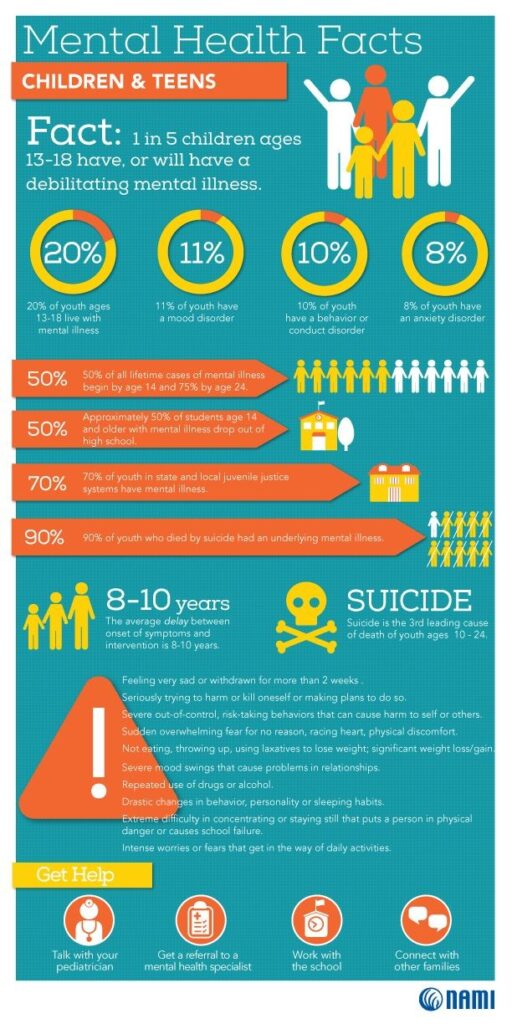
The infographic highlights critical mental health statistics for children and teens, emphasizing early intervention and awareness. It also underscores the link between mental illness and issues like school dropout rates, juvenile justice involvement, and suicide risk.
Psychological and Emotional Impact on Children
Children are highly sensitive to their home environment, and exposure to persistent family conflicts or parental stress can significantly impact their psychological well-being. The way parents manage stress and conflict directly influences a child’s emotional development, shaping their ability to regulate emotions and cope with challenges.
Effects on Emotional Regulation
Children rely on their caregivers to learn how to manage emotions. When exposed to frequent arguments, tension, or hostility at home, they may struggle with emotional regulation. Studies show that children from high-conflict homes are more likely to experience:
Anxiety: Constant exposure to stress creates a sense of fear and uncertainty, leading to excessive worry and social withdrawal.
Depression: A lack of emotional security and support can lead to persistent sadness, low self-esteem, and feelings of hopelessness.
Anger Issues: Witnessing or experiencing hostility can normalize aggression, leading to outbursts, defiance, or trouble forming healthy relationships.
Parental Stress and Emotional Detachment
Parental stress can manifest in two primary ways—emotional detachment or over-involvement—both of which can negatively impact children.
Emotional Detachment: Stressed parents may become emotionally unavailable, unresponsive, or neglectful. Children in such environments often feel isolated, insecure, and unworthy of attention, which increases the risk of anxiety and depression.
Over-Involvement: Some parents, overwhelmed by stress, may become overly controlling or anxious about their child’s life, leading to increased pressure on the child. This can result in perfectionism, fear of failure, and heightened stress levels in children.
Research Findings on Long-Term Impact
Scientific studies indicate that prolonged exposure to parental stress and conflict can have lasting effects. The landmark Adverse Childhood Experiences (ACEs) study found that children raised in high-stress environments are more likely to develop chronic mental health conditions, including depression and anxiety, in adulthood.
Furthermore, research shows that exposure to chronic stress can alter brain development, particularly in areas responsible for emotion regulation, such as the amygdala and prefrontal cortex.
Case Study Example
A study published in Child Development followed children from high-conflict homes and found that those who experienced prolonged family stress had higher cortisol levels, leading to difficulties in emotional regulation and social interactions. One case involved a 10-year-old boy who exhibited severe anxiety and withdrawal after years of exposure to parental conflict.
Through therapy and family interventions, he gradually developed coping strategies, highlighting the importance of early intervention.
Understanding these psychological effects emphasizes the need for a supportive home environment and intervention strategies, which we will explore in later sections.
Cognitive and Academic Consequences
A child’s ability to learn and perform academically is closely linked to their emotional well-being. When exposed to persistent family conflicts and parental stress, children often struggle with focus, memory, and overall cognitive development. The stress they experience at home can create significant barriers to academic success, affecting their motivation, concentration, and classroom behavior.
How Stress Affects Focus, Memory, and Learning
Stressful home environments create a constant state of emotional distress, which directly affects cognitive functions such as attention, problem-solving, and memory retention. Children who are preoccupied with household tensions may find it difficult to concentrate in school, process new information, or retain lessons.
Studies suggest that children exposed to chronic stress are more likely to exhibit symptoms of attention-deficit disorders and struggle with executive functioning skills, such as time management and organization.
The Link Between Family Conflict and Academic Performance
Research has consistently shown a strong correlation between family conflict and poor academic outcomes. Children from high-conflict homes often display:
Lower grades: Anxiety and emotional instability make it difficult to focus on studies.
Reduced classroom participation: Feelings of insecurity and self-doubt can lead to social withdrawal.
Increased school absenteeism: Stress-related fatigue, headaches, and emotional distress contribute to missed school days.
A study published in the Journal of Family Psychology found that children exposed to ongoing parental conflict scored significantly lower on standardized academic tests compared to their peers from stable households. Additionally, prolonged stress at home reduces a child’s motivation to learn and achieve, further widening academic gaps.
The Impact of Stress Hormones on Brain Development
When children experience chronic stress, their bodies release excessive amounts of cortisol, a stress hormone. High cortisol levels have been linked to impaired brain development, particularly in areas responsible for memory and learning, such as the hippocampus.
Neuroimaging studies have revealed that children raised in high-stress environments often show reduced neural connectivity, affecting their ability to process information effectively.
Teacher Observations and Real-Life Examples
Educators frequently observe behavioral changes in children from high-stress households. Teachers report that these students often appear distracted, fatigued, or emotionally overwhelmed in class. For example, a fifth-grade teacher in a 2022 study noticed that a previously high-achieving student’s grades declined drastically after his parents’ divorce, demonstrating how family turmoil can disrupt academic focus.
Understanding these cognitive and academic consequences underscores the importance of providing emotional and academic support for children facing family-related stress.
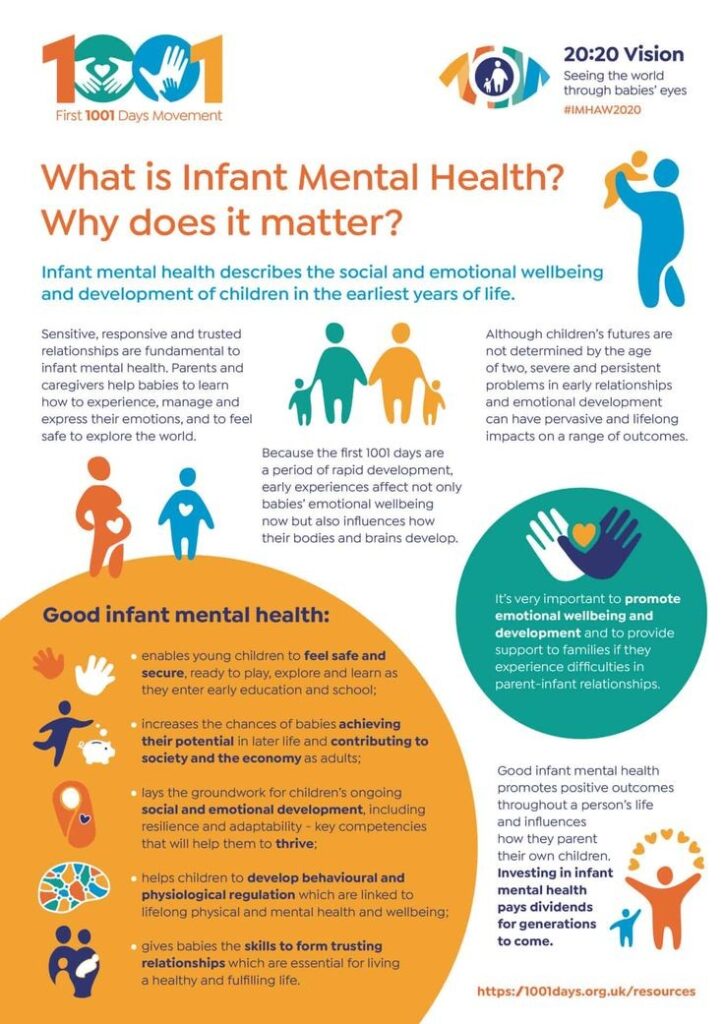
The infographic emphasizes the importance of infant mental health in shaping emotional and social development during early childhood. It highlights how early relationships influence lifelong well-being and calls for promoting emotional support for families.
Behavioral and Social Consequences
A child’s early home environment significantly influences their social behavior and interpersonal skills. When children are exposed to family conflicts and parental stress, they often struggle with emotional regulation, leading to noticeable changes in their behavior and social interactions.
These effects can manifest in childhood and persist into adolescence, increasing the risk of long-term social and behavioral challenges.
Increased Aggression, Withdrawal, and Attention-Seeking Behaviors
Children react to family stress in different ways, depending on their temperament and coping mechanisms. Some common responses include:
Aggression: Witnessing frequent arguments or hostility at home may normalize aggressive behavior, leading to bullying, defiance, or difficulty following rules.
Social Withdrawal: Some children become introverted, avoiding social interactions due to fear of rejection or emotional distress. This can lead to isolation and difficulties in forming friendships.
Attention-Seeking Behaviors: In some cases, children may act out in class or at home to gain attention, even if it results in negative consequences. This behavior is often a cry for emotional support.
Difficulty in Forming and Maintaining Friendships
Healthy social relationships require emotional stability and trust, both of which can be disrupted by a stressful home environment. Children exposed to high levels of conflict may struggle to:
Communicate effectively with peers.
Resolve conflicts in a healthy manner.
Develop trust in friendships.
Research from the Journal of Child and Family Studies found that children from conflict-ridden homes were more likely to experience peer rejection, loneliness, and difficulty in cooperative play. This can lead to social anxiety and low self-esteem.
The Risk of Engaging in Risky Behaviors
Adolescents who grow up in stressful or conflict-heavy households are at a higher risk of engaging in risky behaviors, such as:
Substance abuse: Seeking relief from emotional distress through alcohol or drugs.
Delinquency: Increased likelihood of engaging in theft, vandalism, or violence.
Early involvement in unhealthy relationships: Lack of positive role models at home may lead to toxic relationship patterns.
A study from the American Academy of Pediatrics revealed that teenagers exposed to chronic family stress were twice as likely to engage in substance abuse as those from stable households.
Research-Backed Insights on Social Development
Psychologists emphasize that early childhood stress can alter brain regions responsible for emotional regulation and social behavior. Studies show that children with insecure attachments to their parents tend to have more difficulty in social settings. However, interventions such as counseling, mentoring programs, and school-based support systems can help mitigate these effects.
Recognizing these behavioral and social challenges underscores the need for proactive intervention to support children in developing healthy emotional and social skills.
Long-Term Effects on Adult Mental Health
The impact of family conflicts and parental stress does not end in childhood. Research shows that exposure to a stressful home environment during early years can have lasting effects on mental health, relationships, and overall well-being in adulthood. These long-term consequences highlight the importance of early intervention and support for children growing up in high-stress households.
Impact on Adult Relationships and Mental Health
Children who grow up in conflict-ridden or stressful environments often struggle with emotional regulation and interpersonal relationships later in life. Common long-term effects include:
Difficulty in forming healthy relationships: Adults who experienced childhood stress may have trust issues, fear of abandonment, or difficulty expressing emotions in relationships.
Higher risk of anxiety and depression: Studies show that chronic exposure to stress in childhood increases the likelihood of developing anxiety disorders, depression, and even post-traumatic stress disorder (PTSD) in adulthood.
Low self-esteem and emotional instability: Adults who experienced neglect or emotional turmoil during childhood may struggle with self-worth, leading to challenges in both personal and professional life.
The Cycle of Intergenerational Stress and Conflict
One of the most concerning effects of childhood exposure to family conflict is the continuation of stress patterns across generations. Research suggests that individuals who experience high levels of household stress as children are more likely to:
Experience relationship conflicts similar to those they witnessed growing up.
Struggle with parenting, potentially exposing their own children to the same stress and conflicts they endured.
Develop maladaptive coping mechanisms, such as substance abuse or emotional withdrawal, which can perpetuate family dysfunction.
This cycle of intergenerational stress highlights the need for breaking negative family patterns through therapy, emotional awareness, and healthy coping strategies.
Studies on Adverse Childhood Experiences (ACEs)
The landmark Adverse Childhood Experiences (ACEs) Study by the Centers for Disease Control and Prevention (CDC) found a strong link between childhood trauma and poor health outcomes in adulthood. Key findings include:
Individuals with high ACE scores (indicating significant childhood stress) are twice as likely to suffer from depression and anxiety.
Exposure to chronic childhood stress increases the risk of substance abuse and unhealthy coping mechanisms.
ACEs contribute to long-term physical health problems, including heart disease and weakened immune function.
These findings emphasize the importance of early intervention, supportive parenting, and mental health awareness to break the cycle of childhood stress and improve long-term well-being.
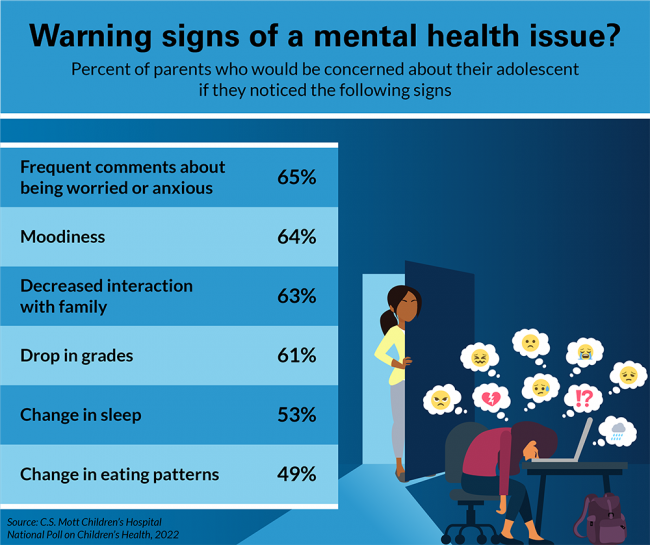
The infographic highlights key warning signs of adolescent mental health issues, such as anxiety, moodiness, and social withdrawal. It presents statistics on parental concerns, emphasizing the importance of early intervention.
Strategies for Mitigation and Support
While family conflicts and parental stress can have significant negative effects on a child’s mental health, there are effective strategies to reduce their impact. Creating a supportive home and school environment, adopting positive parenting techniques, and seeking professional help when necessary can greatly improve a child’s emotional well-being.
The Importance of Open Communication and Conflict Resolution
Healthy communication within a family is key to reducing conflicts and emotional distress. Parents should:
Encourage open discussions where children feel safe expressing their feelings.
Use calm and respectful communication rather than resorting to shouting or blame.
Model effective conflict resolution by working through disagreements constructively.
A study published in the Journal of Family Psychology found that children in families that practice open communication have better emotional resilience, even in stressful situations.
The Role of Positive Parenting in Stress Reduction
Adopting positive parenting techniques can help reduce the impact of stress on children. These include:
Consistency and routine: Predictable routines provide children with a sense of security.
Emotional validation: Acknowledging a child’s feelings rather than dismissing them strengthens emotional bonds.
Healthy discipline strategies: Using guidance rather than punishment promotes emotional growth.
Research from the Harvard Center on the Developing Child highlights that responsive parenting lowers cortisol (stress hormone) levels in children, reducing anxiety and emotional distress.
How Schools and Teachers Can Support Affected Children
Teachers play a crucial role in supporting students facing family-related stress. Schools can help by:
Creating a safe space where children feel heard and supported.
Providing access to counseling services and emotional well-being programs.
Implementing social-emotional learning (SEL) programs to help children develop coping skills.
Psychological Interventions and Professional Help
When family stress becomes overwhelming, professional intervention may be necessary. Psychological support includes:
Cognitive-behavioral therapy (CBT): Helps children manage anxiety and negative emotions.
Family therapy: Addresses underlying issues and improves communication within the household.
Support groups: Provide children and parents with shared experiences and coping strategies.
Effective Research-Based Programs
Programs such as Triple P (Positive Parenting Program) and Mindfulness-Based Stress Reduction (MBSR) have shown success in reducing family stress and improving child mental health. Early intervention and support can help break the cycle of stress, ensuring a healthier future for children.
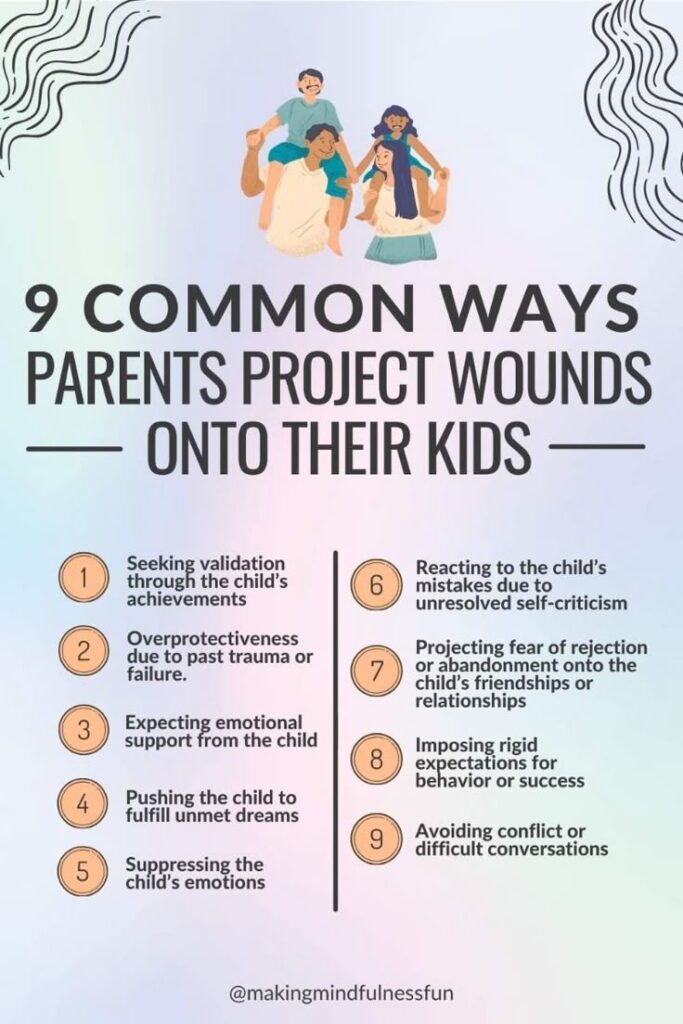
The image outlines nine common ways parents unknowingly project their unresolved emotional wounds onto their children. It highlights behaviors like seeking validation, suppressing emotions, and imposing rigid expectations, emphasizing the need for self-awareness in parenting.
Building a Supportive Future: Breaking the Cycle of Stress and Conflict
Family conflicts and parental stress have profound and lasting effects on a child’s mental health, emotional stability, and overall well-being. As explored in this article, a tense home environment can lead to emotional struggles such as anxiety and depression, cognitive difficulties that affect academic performance, and social challenges that hinder relationship-building.
If left unaddressed, these stressors can extend into adulthood, increasing the risk of mental health issues and perpetuating intergenerational cycles of conflict and stress.
The research-backed evidence presented highlights the critical role that both parents and educators play in mitigating these effects. Open communication and healthy conflict resolution within families can create a more secure and nurturing environment for children.
Positive parenting techniques, such as emotional validation and structured discipline, help build resilience and self-confidence in children. Schools and teachers, too, have an essential role in identifying children who may be struggling and offering them the necessary support through counseling services and emotional development programs.
One of the most important takeaways from this discussion is the need for awareness and early intervention. Parents who recognize signs of distress in their children should not hesitate to seek professional help, whether through therapy, parenting programs, or peer support groups. Psychological interventions such as cognitive-behavioral therapy (CBT) and family therapy have proven to be effective in reducing the impact of stress on children.
Additionally, research-backed programs like Triple P (Positive Parenting Program) and Mindfulness-Based Stress Reduction (MBSR) have been successful in helping families develop healthier communication patterns and stress-management techniques.
While family stress is a common challenge, it does not have to define a child’s future. With the right interventions and a commitment to fostering a supportive environment, parents and educators can help children build emotional resilience, confidence, and a strong foundation for lifelong mental well-being.
The goal should be to create homes and schools where children feel heard, valued, and safe, ensuring they grow into emotionally healthy adults who can break the cycle of stress and conflict.
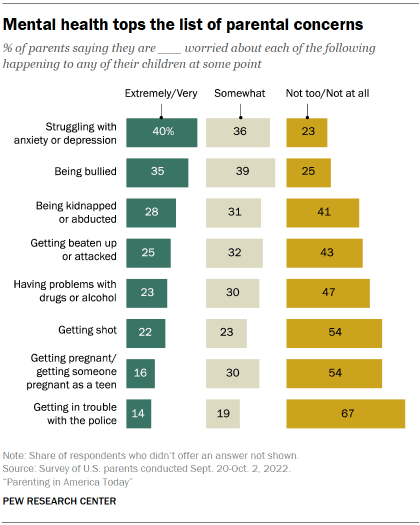
The Pew Research Center survey shows that mental health concerns top parental worries, with 40% of U.S. parents extremely or very worried about their child struggling with anxiety or depression. Concerns about bullying (35%) and kidnapping (28%) also rank high, while fewer parents worry about issues like trouble with the police (14%) or teen pregnancy (16%).
By taking proactive steps today, we can ensure a healthier and more hopeful future for the next generation.
FAQs on How Family Conflicts and Parental Stress Affect a Child’s Mental Health
How do family conflicts affect a child’s mental health?
Family conflicts create emotional distress, leading to anxiety, depression, and behavioral issues in children. Constant exposure to stress can disrupt emotional regulation and increase feelings of insecurity.
What is parental stress, and how does it impact children?
Parental stress refers to overwhelming feelings due to work, finances, or family responsibilities. When unmanaged, it can lead to emotional unavailability, harsh parenting, or over-involvement, negatively affecting a child’s emotional well-being.
Are all family conflicts harmful to children?
Occasional disagreements are normal, but frequent, unresolved, or intense conflicts can create a hostile environment, leading to long-term psychological effects. Healthy conflict resolution teaches children problem-solving skills.
How do children react differently to family conflicts?
Some children become anxious and withdrawn, while others act out with aggression or attention-seeking behaviors. Reactions depend on temperament, age, and the nature of the conflict.
Can even young children be affected by parental stress and conflicts?
Yes, even infants and toddlers can sense tension at home. Studies show that exposure to stress in early childhood can affect brain development and emotional security.
Can family conflicts cause anxiety and depression in children?
Yes, children from high-conflict homes are more prone to anxiety, depression, and low self-esteem due to chronic emotional stress.
What role does parental stress play in emotional neglect?
Stressed parents may become emotionally distant or unresponsive, making children feel isolated, unheard, and insecure in their relationships.
How do family conflicts affect a child’s ability to handle emotions?
Children exposed to unresolved conflicts often struggle with emotional regulation, leading to difficulty managing anger, frustration, or sadness.
Can witnessing parental arguments lead to aggressive behavior in children?
Yes, children may imitate aggressive behavior, believing it to be an acceptable way to handle disagreements, which can affect their peer relationships.
How does childhood stress affect brain development?
Chronic stress increases cortisol levels, which can harm areas of the brain responsible for memory, learning, and emotional regulation.
How does stress at home affect a child’s academic performance?
Stress can impair focus, memory, and problem-solving abilities, leading to lower grades, difficulty concentrating in class, and lack of motivation.
Do children from high-conflict homes struggle with friendships?
Yes, they may have trouble trusting others, communicating effectively, or managing conflicts, leading to social withdrawal or unhealthy relationships.
Can family stress make children more vulnerable to peer pressure?
Yes, children seeking emotional stability may engage in risky behaviors, such as substance use or delinquency, to cope with stress.
Can childhood exposure to family stress affect relationships in adulthood?
Yes, children raised in high-stress environments may develop trust issues, fear of abandonment, or difficulty maintaining healthy relationships.
What is the intergenerational cycle of stress and conflict?
Unresolved childhood stress can lead to poor emotional regulation and parenting challenges in adulthood, perpetuating stress across generations.
Is there research linking childhood stress to adult mental health issues?
Studies on Adverse Childhood Experiences (ACEs) show that childhood stress increases the risk of depression, anxiety, and even physical health problems in adulthood.
How can parents reduce stress and conflicts at home?
Open communication, stress management techniques, positive parenting, and seeking support when needed can help create a healthier home environment.
How can teachers help students affected by family conflicts?
Teachers can provide emotional support, create safe spaces for expression, and encourage social-emotional learning (SEL) to build coping skills.
When should a family seek professional help?
If conflicts lead to emotional distress, severe anxiety, or behavioral issues in children, seeking therapy or counseling can help resolve underlying problems.
What are some effective programs to support children in high-stress families?
Research-backed programs like Triple P (Positive Parenting Program) and Cognitive Behavioral Therapy (CBT) can help children and parents develop healthy coping strategies.
Take Action: Create a Healthier Home for Your Child’s Well-Being
Family conflicts and parental stress can deeply affect a child’s mental health, but the good news is that change is possible. By fostering open communication, practicing positive parenting, and seeking support when needed, you can create a more stable and nurturing environment for your child.
Parents: Prioritize emotional connection with your child, model healthy conflict resolution, and seek help if stress becomes overwhelming.
Teachers: Be a source of support and encouragement for students facing family challenges. Offer a safe space and advocate for emotional well-being programs.
Community Members: Promote awareness about childhood mental health and support families through counseling programs, support groups, and education.
If you notice signs of emotional distress in a child, don’t ignore them. Small actions today can lead to a lifetime of emotional resilience and success. Let’s work together to break the cycle of stress and conflict—because every child deserves a safe, loving, and supportive environment.
Take the next step: Explore parenting resources, attend a workshop, or reach out to a mental health professional if needed. Your actions today can shape a brighter, healthier future for the next generation!





